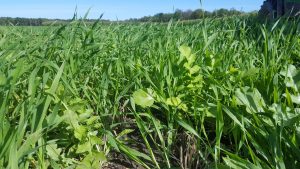Home » Natural Resources » Shell Lake-Yellow River Farmer-Led Watershed Council » Practices
Practices

A number of practices can help protect water quality, including reducing tillage, rotational grazing, cover crops, following a nutrient management plan, grass waterways and streambank buffers. Our council is currently focused on no till/reduce tillage, rotational or managed grazing, and cover crops.
No till/reduce tillage
By reducing tillage or switching to no-till the soil is disturbed less, which can reduce erosion. Soil often has phosphorous bound to it, which is why its valuable to keep the soil in place in a field and out of lakes and rivers. Reducing tillage or switching to no-till also saves money on diesel fuel, because less passes over the field are needed. On average, conventional tillage uses around 6 gallons of diesel fuel per acre each year, while no-till uses less than 2 gallons per acre.
Rotational or managed grazing
A rotational or managed grazing system has livestock using a pasture for a limited time then moving them to a new pasture to allow the grazed pasture to recover. Because the pasture is allowed to recover, or “rest”, the forage plants are able to renew energy reserves, deepen their root system, and give long-term maximum production. Continuously grazed pastures often have poor fertility, weed and erosion problems, and they can contribute runoff carrying nutrients to nearby waterbodies.
Learn how council member Dave Fogerty is using alternative forages to address summer slump and his dry sandy soils: click here for video playlist
Cover Crops
Cover crops consist of any plants that are being primarily used to improved soil health, control weeds and diseases, increase biodiversity, and slow erosion among other benefits. Cover crops are a long-term investment in improving your soil, since it may take a few years to see a positive change. Studies have shown a yield increase in corn and soybeans when cover crops are used in five consecutive years, and a greater increase in drought years. For more information see Cover Crop Economics: Opportunities to Improve your Bottom Dollar.




